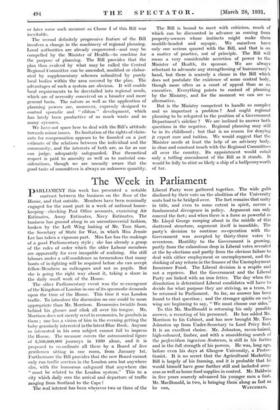The Week in Parliament p ARLIAMENT this week has presented a
notable contrast between the business on the floor of the House, and that outside. Members have been nominally engaged for the most part in a week of national house- keeping—checking Post Office accounts, examining Air Estimates, Army Estimates, Navy Estimates. The business has ground along in an uncontroversial fashion, broken by the Left Wing baiting of Mr. Tom Shaw, the Secretary of State for War, in which Miss Jennie Lee has taken a vigorous part. Miss Lee has the makings of a good Parliamentary style ; she has already a grasp of the rules of order which the older Labour members arc apparently for ever incapable of realizing. She still labours under a self-confidence so tremendous that many bouts of in-fighting will be required before she can accept fellow-Members as colleagues and not as pupils. But she is going the right way about it, taking a share in the daily small work of the House.
The other Parliamentary event was the re-emergence of the Kingdom of London in one of its spasmodic demands upon the time of the House. This time it was London traffic. To introduce the discussion no one could be more appropriate than Mr. Morrison. Economics twinkle from behind his glasses and clink all over his tongue. Mr. Morrison does not merely revel in economics, he gambols in them ; one has a vision of him in the evening getting the baby genuinely interested in the latest Blue Book. Anyone so interested in his own subject cannot fail to impress the House. The measure covers the astronomical figure of 8,500,000,000 journeys in 1930 alone, and it is proposed to co-ordinate all these by a Board of five gentlemen sitting in one room, from January 1st. Furthermore the Bill provides that the new Board cannot only run traffic services in the London area but anywhere else, with the humorous safeguard that anywhere else "must be related to the London system." This to a city which daily sees the arrival and departure of traffic ranging from Scotland to the Cape The real interest has been wherever two or three of the Liberal Party were gathered together. The wide gulfs disclosed by their, vote on the abolition of the University seats had to be bridged over. The fact remains that unity in title, and even to some extent in spirit, covers a fundamental divergence in policy. Argument can only conceal the fact; and when there is a force as powerful as Mr. Lloyd George ramping about in the middle of this shattered structure, argument itself is inaudible. The party's decision to continue co-operation with the Government was accepted by thirty-three votes to seventeen. Hostility to the Government is growing, partly from the calamitous drop in Liberal votes revealed at the by-elections and partly from the obvious failure to deal with either employment or unemployment, and the shirking of any reform in the finance of the Unemployment Insurance Fund. The Liberal decision is a respite and not a reprieve. But the Government and the Liberal Party are linked with an iron fetter. The day when the dissolution is determined Liberal candidates will have to decide for what purpose they are striving, as a team, to be returned to Parliament. So far, no answer has been found to that question ; and the stronger spirits on each wing are beginning to say, "We must choose our sides."
To this Mr. MacDonald is returning his only possible answer, a recasting of his personnel. He has added Mr. Morrison to his Cabinet, and has now brought Mr. Toni Johnston up from Under-Secretary to Lord Privy Seal. It is an excellent choice. Mr. Johnston, raven-haired, high-coloured, limber, and with a smouldering scorch of the perfercidum ingenium Scotorum, is still in his forties and in the full strength of his powers. He was, long ago, before even his days at Glasgow University, a Protec- tionist. It is no secret that the Agricultural Marketing Bill is largely of his framing, and it is probable that he would himself have gone further still and included over- seas as well as home food supplies in control. Mr. Baldwin in five years scarcely advanced his younger men a foot. Mr. MacDonald, in two, is bringing then; along as fast as














































 Previous page
Previous page